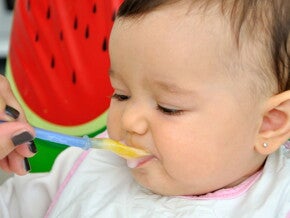
Q1: What are the vitamins your child needs and their sources?
It is very important for the mother to be keen on bringing up her children on healthy food that is comprehensive and diversified, and that she gets them used to this type of food. It is also important for her to avoid unhealthy food such as fast food, sweets and canned juices because they are not useful and do not offer any benefit for the child's body.
The most important vitamins the child needs after birth:
Vitamin A
The benefits of Vitamin A:
• Essential for the maintenance, repair and growth of body tissues
• Helps to keep the skin and mucous membranes intact
• Strengthens the immune system against diseases
The sources of Vitamin A:
It is found in milk, cheese, tuna, carrots, tomatoes, leafy vegetables, mangoes, apricots, broccoli and sweet potatoes.
For example, offer the mashed sweet potatoes to your child at lunch as they are rich in Vitamin A.
Vitamin C
The benefits of Vitamin C:
• Necessary for the safety of the blood vessels, bones, and muscles
• Helps in the healing of wounds
• Increases the absorption of iron found in food
• Helps protect cells and strengthens the body's immune system
• Maintains the safety of the gums
The sources of Vitamin C:
It is found in fruits, especially citrus fruits such as lemon, grapefruit, fruit juice, leafy vegetables, pepper, tomatoes and potatoes.
For example, offer oranges to your child as a snack because they are rich in Vitamin C.
Vitamin D
The benefits of Vitamin D:
• Helps the body absorb the calcium from the food, so it is essential for the maintenance of healthy bones and teeth
• Important and necessary for the integrity of the nervous system and the heart
• Helps to install calcium in the bones
The sources of Vitamin D:
The main source of this vitamin remains the synthesis of vitamin D in the skin through exposing your child to sunlight. It is present in salmon, egg yolks, and fortified cereals for children and milk.
Reducing the prevalence of Vitamin D deficiency can be achieved by encouraging your child to be exposed to the sun for 20 minutes, three times a week, and eating foods fortified with vitamin D, such as milk and special cereal meals for children.
Folic acid
The benefits of folic acid:
• Contributes to the maintenance of red blood cells
• Contributes to the formation of new cells
The sources of folic acid:
Present in leafy vegetables, especially spinach, green beans, peas, potatoes, oranges, as well as milk and dairy products.
For example, offer your child cooked spinach at lunch because it is rich in folic acid.
The American Society of Preventive Medicine does not generally recommend taking vitamins over long periods and on a continuous basis. If the child is healthy, active, normal and has good appetite, he does not need vitamins or minerals from a source other than natural nutrition. But in case some abnormal symptoms are observed, you should consult a doctor before giving children any vitamins, in order to protect their health and safety.
Q2: What are the minerals your child needs and their sources?
The most important minerals the child needs after birth:
Calcium
The benefits of calcium:
• Necessary for the maintenance of bones and teeth
• Essential for the process of contraction and relaxation of the muscles, including the heart.
• Important for the proper functioning of the nerves and nervous transportation.
The sources of calcium:
Present in milk and dairy products, bread, leafy vegetables, dried fruits, nuts, seeds, in addition to drinking water and soft bones in canned fish such as sardines.
For example, offer milk or a cheese sandwich to your child at dinner because they are rich in calcium.
Iron
The benefits of iron:
• A major component of hemoglobin found in red blood cells that carry oxygen to the whole body
• Vitamin C helps the body to absorb iron from food better.
• The anemia caused by iron deficiency is one of the most common nutritional problems all over the world, especially in the Middle East. It is an important disease because it has negative consequences for children's health.
The sources of iron:
Present in meat and its products, apricots, bread, grains, vegetables and fortified infant cereals.
For example, offer your child meat for lunch or fortified cereals for breakfast because they are rich in iron.
Zinc
The benefits of zinc:
• Necessary for producing energy from the food we eat
• Essential for the maintenance of the palatal sense
• Essential for the growth and renewal of cells
• Helps in wound healing
The sources of zinc:
Present in meat and its products, milk and dairy products, bread and cereals.



















